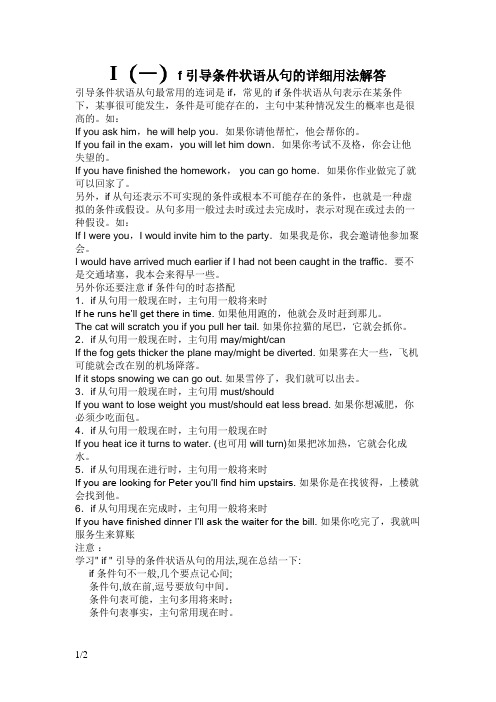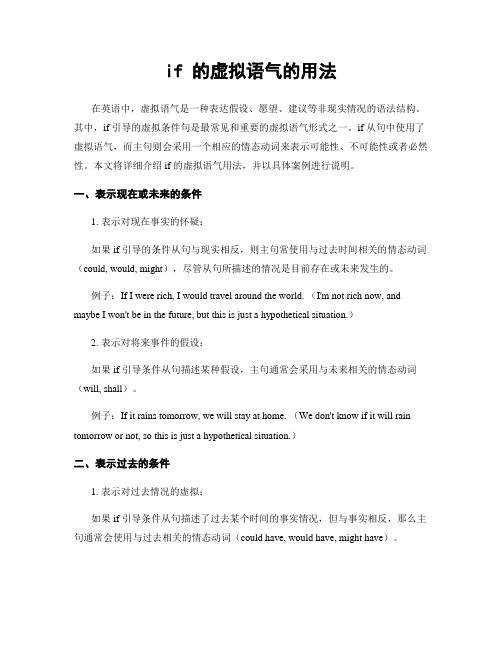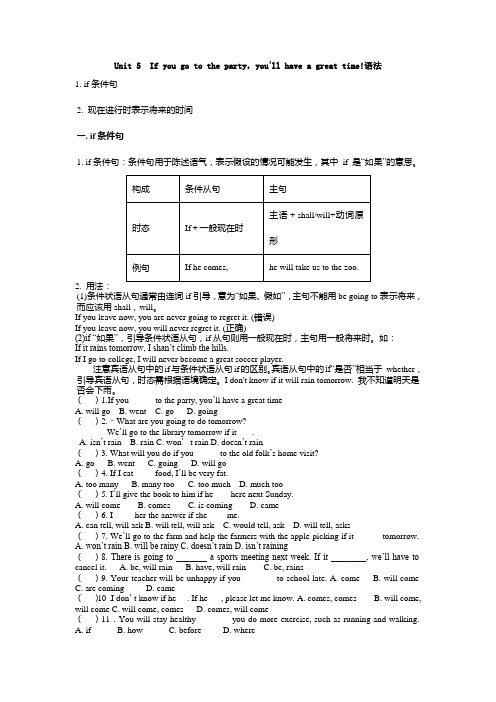If 条件句的用法1
if句型的用法总结

if句型的用法总结1. if句型的基本用法if句型是英语中最常用的条件句句型之一,它用于描述一个条件成立时会发生什么样的结果。
基本的if句型结构为:if 条件:条件成立时执行的代码块在这个结构中,条件决定了是否执行代码块的部分。
如果条件成立,代码块将会被执行;如果条件不成立,则代码块将会被忽略。
2. if…else句型除了基本的if句型外,还有一个常见的变体——if…else句型。
它在条件成立时执行一个代码块,并在条件不成立时执行另一个代码块。
其结构如下:if 条件:条件成立时执行的代码块else:条件不成立时执行的代码块在if…else句型中,如果条件成立,将执行if代码块;否则,将执行else代码块。
3. if…elif…else句型在某些情况下,我们可能需要判断多个条件,并根据不同的条件执行不同的代码块。
这时,可以使用if…elif…else句型。
其结构如下:if 条件1:条件1成立时执行的代码块elif 条件2:条件2成立时执行的代码块elif 条件3:条件3成立时执行的代码块...else:条件都不成立时执行的代码块在if…elif…else句型中,只有当前面的条件不成立时才会判断后面的条件。
如果某个条件成立,将执行对应的代码块。
如果所有条件都不成立,将执行else代码块。
4. 嵌套if语句在某些情况下,我们可能需要在if代码块中再次使用if语句,这就是嵌套if语句。
嵌套if语句可以用于处理更复杂的条件判断。
例如:if 条件1:if 条件2:条件1和条件2同时成立时执行的代码块else:条件1成立,但条件2不成立时执行的代码块else:条件1不成立时执行的代码块在嵌套if语句中,内部的if语句只有在外部if语句的条件成立时才会被执行。
5. if语句的注意事项•条件表达式:–条件表达式应该是一个布尔表达式,即可以判断为真或假的表达式。
–可以使用比较运算符(如==、!=、<、>等)、逻辑运算符(如and、or等)以及其他返回布尔值的函数或表达式作为条件。
if的条件句的三种用法

千里之行,始于足下。
if的条件句的三种用法
条件句是用于表达假设情况的句子,其中最常用的是if条件句。
if条件句有三种常见的用法:
1. 条件句表示现在或将来的可能情况:
- If it rains tomorrow, we won't go for a picnic.
- 如果明天下雨,我们将不会去野餐。
2. 条件句表示现在或将来的假设情况:
- If I were you, I would study harder.
- 如果我是你,我会更加努力学习。
3. 条件句表示过去不可能实现的情况:
- If I had known, I would have helped you.
- 如果我知道的话,我本来可以帮助你的。
以上是if条件句的三种常见用法,它们分别用于表示现在或将来的可能情况、现在或将来的假设情况以及过去不可能实现的情况。
第1页/共1页。
If引导条件状语从句的详细用法解答

I(一)f引导条件状语从句的详细用法解答引导条件状语从句最常用的连词是if,常见的if条件状语从句表示在某条件下,某事很可能发生,条件是可能存在的,主句中某种情况发生的概率也是很高的。
如:If you ask him,he will help you.如果你请他帮忙,他会帮你的。
If you fail in the exam,you will let him down.如果你考试不及格,你会让他失望的。
If you have finished the homework, you can go home.如果你作业做完了就可以回家了。
另外,if从句还表示不可实现的条件或根本不可能存在的条件,也就是一种虚拟的条件或假设。
从句多用一般过去时或过去完成时,表示对现在或过去的一种假设。
如:If I were you,I would invite him to the party.如果我是你,我会邀请他参加聚会。
I would have arrived much earlier if I had not been caught in the traffic.要不是交通堵塞,我本会来得早一些。
另外你还要注意if 条件句的时态搭配1.if从句用一般现在时,主句用一般将来时If he runs he’ll get there in time. 如果他用跑的,他就会及时赶到那儿。
The cat will scratch you if you pull her tail. 如果你拉猫的尾巴,它就会抓你。
2.if从句用一般现在时,主句用may/might/canIf the fog gets thicker the plane may/might be diverted. 如果雾在大一些,飞机可能就会改在别的机场降落。
If it stops snowing we can go out. 如果雪停了,我们就可以出去。
3.if从句用一般现在时,主句用must/shouldIf you want to lose weight you must/should eat less bread. 如果你想减肥,你必须少吃面包。
if条件状语从句的用法_If引导的条件状语从句

if条件状语从句的用法_If引导的条件状语从句很多英语学习者都觉得If引导的条件状语从句这个句型很难,学习起来很吃力。
下面是小编为你整理的If引导的条件状语从句的相关资料,希望大家喜欢!If引导的条件状语从句用法1.if引导的条件状语从句可以放在主句之前,也可以放在主句之后,如果放在主句之前,中间要用逗号将主句和从句隔开。
例如:If I am free, I will come to see you.= I will come to see you if I am free.如果我有空,我就来看你。
2. 在含if引导的条件状语从句的复合句中,主句用一般将来时,从句通常用一般现在时态表示将来意义,即主将从现原则。
例如:If it snows tomorrow, we will go skiing.如果明天下雪,我们就去滑雪。
3. 在含if引导的条件状语从句的复合句中,语句的谓语还可含有情态动词can、must、may等,主句也可是祈使句。
例如:If it stops raining, we can go out.如果雨停了,我们就能出去。
4. 在含if引导的条件状语从句的复合句中,如果主句部分描述的是客观事实或真理,要用一般现在时。
例如:If you heat the ice, it turns into water.如果你加热冰,它就会变成水。
if引导的非真实条件句对过去的虚拟条件从句(if):主语+had done 主句might/would/should/could+have done 对现在的虚拟if+ 主语+动词过去式(be用were)主句might/would/should/could+do对将来的虚拟if+主语+动词过去式(be用were)或主语+should do或主语+were to do主句might/would/should/could+doe.g.Tom got to the station in time because he started earlier.If Tom had started late, he would have missed the train.Do you think the thief entered through the door?No, if he had, I don't believe, he would have broken the living room window.If the book weren't so expensive, I would buy it.If you didn't live so far away, we would be able to visit you more.What would you do if you lost your passport in a foreign country?Why hasn't he come? If he should not come on time, we would have to put off the trip.2.注意事项e.g.If she hadn't work hard at English in the past, she wouldn't work as well as a secretary in a large company now. 混合时间的虚拟语气从句为对过去的虚拟,主句是现在。
if 的虚拟语气的用法

if 的虚拟语气的用法在英语中,虚拟语气是一种表达假设、愿望、建议等非现实情况的语法结构。
其中,if 引导的虚拟条件句是最常见和重要的虚拟语气形式之一。
if 从句中使用了虚拟语气,而主句则会采用一个相应的情态动词来表示可能性、不可能性或者必然性。
本文将详细介绍 if 的虚拟语气用法,并以具体案例进行说明。
一、表示现在或未来的条件1. 表示对现在事实的怀疑:如果 if 引导的条件从句与现实相反,则主句常使用与过去时间相关的情态动词(could, would, might),尽管从句所描述的情况是目前存在或未来发生的。
例子:If I were rich, I would travel around the world. (I'm not rich now, and maybe I won't be in the future, but this is just a hypothetical situation.)2. 表示对将来事件的假设:如果 if 引导条件从句描述某种假设,主句通常会采用与未来相关的情态动词(will, shall)。
例子:If it rains tomorrow, we will stay at home. (We don't know if it will rain tomorrow or not, so this is just a hypothetical situation.)二、表示过去的条件1. 表示对过去情况的虚拟:如果 if 引导条件从句描述了过去某个时间的事实情况,但与事实相反,那么主句通常会使用与过去相关的情态动词(could have, would have, might have)。
例子:If she had studied harder, she could have passed the exam. (She didn't study hard enough, so she failed the exam. This is a hypothetical situation that didn't happen in reality.)2. 表示无法改变的过去情况:如果 if 引导条件从句表达了对以往事件的遗憾、怀念或不同寻常反事实假设,主句通常会使用与过去相关的情态动词(could/would/should/might + 过去完成时)。
if条件状语从句的时态搭配

i f条件状语从句的时态搭配It was last revised on January 2, 2021注意i f条件句的时态搭配1.if从句用一般现在时,主句用一般将来时If he runs,he’ll get there in time. 如果他跑,他就会及时赶到那儿。
The cat will scratch you if you pull her tail. 如果你拉猫的尾巴,它就会抓你。
2.if从句用一般现在时,主句用may/might/canIf the fog gets thicker ,the plane may/might be diverted. 如果雾在大一些,飞机可能就会改在别的机场降落。
If it stops snowing ,we can go out. 如果雪停了,我们就可以出去。
3.if从句用一般现在时,主句用must/shouldIf you want to lose weight ,you must/should eat less bread. 如果你想减肥,你必须少吃面包。
4.if从句用一般现在时,主句用一般现在时If you heat ice, it turns to water. (也可用will turn)如果把冰加热,它就会化成水。
5.if从句用现在进行时,主句用一般将来时If you are looking for Peter ,you’ll find him upstairs. 如果你是在找彼得,上楼就会找到他。
6.if从句用现在完成时,主句用一般将来时If you have finished dinner ,I’ll ask the waiter for the bill. 如果你吃完了,我就叫服务生来算账。
If引导条件状语从句

Unit 5 If you go to the party,you’ll have a great time!语法1. if条件句2. 现在进行时表示将来的时间一. if条件句1. if”的意思。
2. 用法:(1)条件状语从句通常由连词if引导,意为“如果、假如”,主句不能用be going to表示将来,而应该用shall,will。
If you leave now, you are never going to regret it. (错误)If you leave now, you will never regret it. (正确)(2)if “如果”,引导条件状语从句,if从句则用一般现在时,主句用一般将来时。
如:If it rains tomorrow, I shan’t climb the hills.If I go to college, I will never become a great soccer player.注意宾语从句中的if与条件状语从句if的区别。
宾语从句中的if“是否”相当于whether,引导宾语从句,时态需根据语境确定。
I don't know if it will rain tomorrow. 我不知道明天是否会下雨。
()1.If you _____ to the party, you’ll have a great timeA. will goB. wentC. goD. going()2.–What are you going to do tomorrow?--We’ll go to the library tomorrow if it ___.A. isn’t rainB. rainC. won’t rainD. doesn’t rain()3. What will you do if you _____ to the old folk’s home visit?A. goB. wentC. goingD. will go()4. If I eat ____ food, I’ll be very fat.A. too manyB. many tooC. too muchD. much too()5. I’ll give the book to him if he ___ here next Sunday.A. will comeB. comesC. is comingD. came()6. I ____ her the answer if she ____me.A. can tell, will askB. will tell, will askC. would tell, askD. will tell, asks()7. We’ll go to the farm and help the farmers with the apple-picking if it ____ tomorrow.A. won’t rainB. will be rainyC. doesn’t rainD. isn’t raining()8. There is going to _______ a sports meeting next week. If it ________, we’ll have to cancel it. A. be, will rain B. have, will rain C. be, rains()9. Your teacher will be unhappy if you _______ to school late. A. come B. will come C. are coming D. came()10.I don’t know if he __. If he __ , please let me know. A. comes, comes B. will come, will come C. will come, comes D. comes, will come()11.You will stay healthy _______ you do more exercise, such as running and walking.A. ifB. howC. beforeD. where()12.If she here tomorrow, I will tell you.A. comesB. will comeC. comeD. came()13. I’m waiting for my friend., I’ll go shopping alone.A. If she comesB. If she doesn’t comeC. If she won’t come()14. —Tom wants to know if you will have a picnic tomorrow.—Yes. But if it ______, we’ll play chess instead.A. will rainB. rainedC. is rainingD. rains()15. If Tom _____ the game, we'll give him a surprise". A. win B. wins C. won D. miming二. 现在进行时表示将来的时间1. 用be doing表示将来:主要意义是表示按计划、安排即将发生的动作,常用于位置转移的动词,如:go,come,leave,arrive等,也可用于其他动作动词,如:We are having fish for dinner. 我们晚饭吃鱼。
If条件句

3.与过去事实相反的虚拟条件句 构成 条件状语从句 主句
If + 主语 + 动词过去完成 主语+ would, should, could, might+ have + 式 过去分词
例如 If there had been no air in the tube, the result would have been better.
某英文网站正在开展关于“高一是否该分文理科”的讨论。 请你根据下面所给的要点提示,用英语写一篇短文, 描述目前存在的两种看法,并陈述你的观点,以便向该网 站投稿。 赞成分科的人认为1. 可集中精力学习;2. 减轻学习压力; 3. 学自己喜欢的学科。 反对分科的人认为1. 学科知识受限制;2. 影响个人素质提 高; 3. 对科目缺乏深入了解。你的观点…… 注意:1.词数:120词左右; 2.参考词汇: 素质:quality n. 分科:division n. 全面的:all-round adj. 3. 短文的开头已给出,不计入词数。
I.虚拟语气用在条件状语从句中 虚拟语气用在条件状语从句中,通常从句由连词if 引导。 1.与现在事实相反的虚拟条件句 条件状语从句 If +主语 +动词过去 式(be的过去式用 were) 主句 主语+ would, should, could, might+动词原形
例 If I feared death, I wouldn’t be a Party member. 怕死就不做共产党员。 If there were no air, we couldn’t live. 如果没有空气,我们就不能生活。
if 引导的条件句 if引导的条件句表示在某种条件下,会导致另 一事发生。句式为if从句+ 主句。 中文意思是“如果某事发生(或不发生), 另一事就(不)发生”。通常分以下两种情形: 一、真实条件句 二、虚拟条件句
- 1、下载文档前请自行甄别文档内容的完整性,平台不提供额外的编辑、内容补充、找答案等附加服务。
- 2、"仅部分预览"的文档,不可在线预览部分如存在完整性等问题,可反馈申请退款(可完整预览的文档不适用该条件!)。
- 3、如文档侵犯您的权益,请联系客服反馈,我们会尽快为您处理(人工客服工作时间:9:00-18:30)。
虚拟
分句) 如果句子的前半段 (if -分句) 是表现现在不大 分句 可能实现的条件,而后半段(主句) 可能实现的条件,而后半段(主句)却表示与过 去事实相反的情况,前后在逻辑意义上不相协调。 去事实相反的情况,前后在逻辑意义上不相协调。 但在保证句子合乎逻辑的前提下, 但在保证句子合乎逻辑的前提下,也可根据语义 意图混合实用俩种句型的动词形式 If he had wanted to dance ,I'd have taken him to discotheque(迪斯科舞厅) 迪斯科舞厅) 迪斯科舞厅
虚拟(第三条件句·第四条件句)
这种是非真实条件句( 这种是非真实条件句(unreal conditional) 的一 所谓“非真实条件” 种。所谓“非真实条件”,在语义上包含着不同 程度的“非真实性” 程度的“非真实性”。这种类型的条件句也可分 为基本形式和变体形式。 为基本形式和变体形式。
虚拟
虚拟
这种句型的动词形式还可根据语义意图采用进行 体形式。 体形式。
If we were on holiday now , we 'd be having a wonderful time
虚拟
变体形式 (If) were to +inf+(main)would,etc+inf 例: If our train were to arrive punctually, we should have time to visit your sister. 要注意表示非真实条件的were to 与表示“义务” 与表示“义务” 要注意表示非真实条件的 (obligation) 的am / is / are to 和was/ were ) to 的区别
非真实条件句 真实条件句
The type 1 :
if≈whenever
Type 1 是真实条件句(Real Conditional)的一种。在 是真实条件句( )的一种。 这种条件句中, 的意义接近于whenever,所以这种句 这种条件句中,if 的意义接近于 , 型又被称为“ 可用于3种 场合: 型又被称为“whenever-型”,可用于 种 场合: 型 1、表示普遍真理和客观事实 (tell the truth) 、 For example: ※ If you pour oil on water, it floats. ※ If the temperature drops to 0 degrees Centigrade, water freezes. 总结:由上两例可看出, 总结:由上两例可看出,凡表示不受时间限制的自然法则 的条件句, 分句和主句的谓语动词都用一般现在时 的条件句,其 if-分句和主句的谓语动词都用一般现在时 : 分句和主句的谓语动词都用 Pattern:( simple present +(Main) simple present :(if) :(
虚拟
主句 if从句 从句
would
过去
have done had done
could
现在
might need
do do
were/ did should/ were to
将来
should
10 分
20分 分
30分 分
40 分
10分题
I used to walk to work.But if it ______(rain), I went by bus. rained
基本类型 (if)simple past / were + (main) would ) (could ,might,etc) +inf 例如 If we caught the 10 o'clock train, we would (could,might,ect)get there by lunch-time. 主句动词都用would could might ,etc 不定式。但 不定式。 主句动词都用 可能性的程度不一样 If I knew how it worked, I could tell you what to do . (条件与现实相反,根本不可能告诉对方做什么) 条件与现实相反,根本不可能告诉对方做什么) 条件与现实相反
虚拟
(If) had + -ed 分词 +Main would (could might,ect) have+ -ed分词 + 分词 例如 If we had caought the 10 o'clock train ,we would have got there by lunch-time. We would /could /might have called you if we had known your telephone number
20分题
If you move to your left, you ____(be)able to see the church
will be
30分题
He could repair the roof himself if he _____(have) a long ladder. had
40分题
2、if –分句 用一般现在时表示将来时间,主句用动词祈使式: 、 分句 用一般现在时表示将来时间,主句用动词祈使式: Pattern : (If)simple present + (Main)imperative ) ) 例句: 例句: ※ If you wake up before me, give me a call . ※ If you go out this room, turn off the lights. 二、变体形式(3种) 变体形式( 种 1、if-分句动词不管主语的人称和数如何,一律用 、 分句动词不管主语的人称和数如何 一律用should+不定式, 分句动词不管主语的人称和数如何, 不定式, 不定式 主句动词可根据语义意图采用不同形式。 主句动词可根据语义意图采用不同形式。 Example : ※ If it should rain again, the flowers will bloom. ※ If you should come tomorrow, I would tell you the truth. 说明:在这里, 仅表示一种不太肯定的婉转口气, 说明:在这里,should 仅表示一种不太肯定的婉转口气,并不影响 条件的真实性。 条件的真实性。
the usage of conditional
If 条件句的用法
条件句
条件句( 条件句(conditional)是由 条件状语 ) 分句( 分句) 分句(if 分句) + 主句 构成的复杂句 (complex sentence)。 。 一共分为三种(3 types) 一共分为三种
1 if ≈ whenever(the meaning is close to) 2 主将状从现 3虚拟 虚拟
虚拟
If he were to get in touch with me , I could explain. = Supposing he got in touch with me...(非真实条件) 非真实条件) 非真实条件 If he was to get in touch with me , why hasn't he done so ? = If the arrangement was that he should get in touch with me , why...? (表示“义务”) 表示“ 表示 义务” 里一个变体是在if-分句中用 里一个变体是在 分句中用would + 不定式 表示不大可能实 分句中用 现的"意愿 意愿" 现的 意愿 If you 'd cook the dinner , i'd do the washingup afterwards.(省略 to) (
If the story hadn't been ture, the newspaper _________(not print) it . wouldn't have printed
if i were a boy ——beyonce
If I were a boy Even just for a day I’d roll outta bed in the morning ’ And throw on what I wanted then go Drink beer with the guys And chase after girls I’d kick it with who I wated ’ And I’d never get confronted for it. ’ Cause they’d stick up for me. ’
注意: 注意: 省略了 to
willing to reserve
3、用 would 还是表示“意愿”,常用于 客气的请求,这时,主语动词 、 还是表示“意愿” 客气的请求,这时, 既可用will/shall +inf. 也可用 也可用would /should / could/ might +inf. 既可用 Example : ※ If you would try Italian food , you would like it.
虚拟
第四条件句的变体形式 (If)were to have + -ed 分词 +Main would ) (could, might, ect)have -ed 分词
例如 If you were to have asked me , I would have been only too willing to help.
2、表示现在习惯动作 、 For example: ※ If it rains, I go to work by bus. ※If I make a promise, I keep it . 总结:在上述表示现在习惯动作的条件句中, 分句和主句的谓语动 总结:在上述表示现在习惯动作的条件句中, if-分句和主句的谓语动 词也都是用一般现在时 一般现在时: 词也都是用一般现在时: Pattern: (if) simple present +(Main) simple present : 3、表示过去的习惯动作 、 For example: ※If I was hungry, I usually had a full meal. 总结:表示过去习惯动作的条件句中, 分句和主句的谓语动词都用 总结:表示过去习惯动作的条件句中,If-分句和主句的谓语动词都用 一般过去时。 一般过去时。
